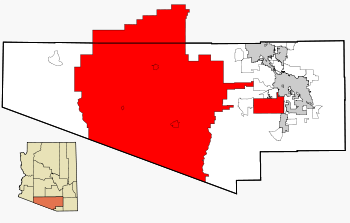Tohono Oʼodham Indian Reservation
32°09′01″N 112°02′41″W / 32.15028°N 112.04472°W


The Tohono Oʼodham Indian Reservation, is an Indian reservation of the Tohono Oʼodham Nation located in Arizona, United States.[1] The reservation had a total 2000 census population of 10,787. The reservation has a land area of 4,340.984 square miles (11,243.098 km2), 97.48 percent of the Tohono Oʼodham Nation total area. The reservation encompasses portions of central Pima, southwestern Pinal, and southeastern Maricopa Counties.
The land is also site of the Quinlan and Baboquivari Mountains, which include Kitt Peak, and the Kitt Peak National Observatory and telescopes, as well as Baboquivari Peak. These astronomical sites are under lease from the Tohono Oʼodham Nation. The lease was approved by the council in the 1950s, for a one-time payment of US$25,000 plus $10 per acre per year.[2]
When the Spaniards first encountered the tribe in 1694, they made note of one of the tribe's inhabited villages called Batki, a site that was later abandoned in about 1850.[3] The village of Batki was located in what is now the Sells District of the Tohono O'odham Nation.
Tohono Oʼodham Nation communities
[edit]Communications
[edit]The telephone area code for the Tohono Oʼodham Reservation is 520.
References
[edit]- ^ "Home". Official Website of the Tohono Oʼodham Nation. 2014. Retrieved 2014-04-24.
- ^ "Astronomy Development on Another Sacred Mountain: Kitt Peak". Mauna Kea – From Mountain to Sea. Na Maka o ka Aina. 2005. Archived from the original on 2008-08-20. Reprinting material from the Arizona Daily Star, 2005.
- ^ Fontana, Bernard L.; Robinson, William J.; Cormack, Charles W.; Leavitt, Earnest E. (1962). Papago Indian Pottery. Seattle, Washington: University of Washington Press, on behalf of the American Ethnological Society. pp. 17, 34. OCLC 869680.
- ^ Clement L. Garner, Triangulation in Arizona, p. 141, Washington: US Government Printing Office, 1941.



